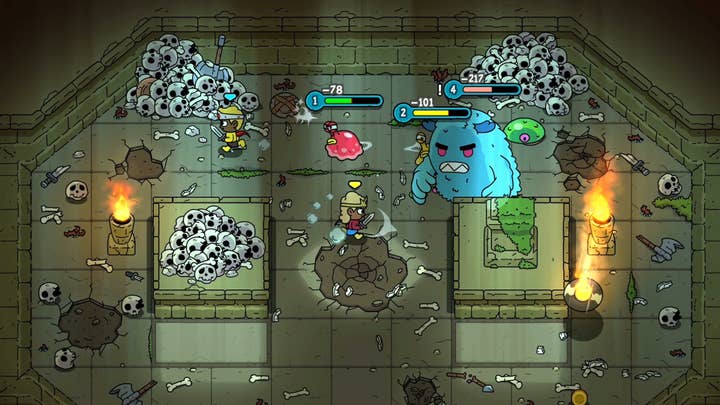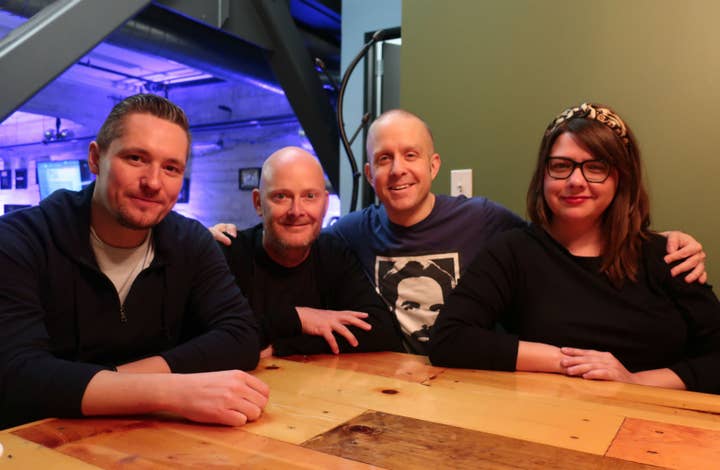The accidental authenticity of Devolver Digital
Graeme Struthers, Kate Ludlow, John Bartkiw and Andrew Parsons reflect on a decade of personality-driven indie publishing
Devolver Digital is nearing its tenth anniversary, having published somewhere in the ballpark of 100 games. It has a sizeable following for an independent publisher. It even has its own E3 press conference.
It also only has 16 employees, all of whom work remotely. The company's official mailing address is a bird store owned by one of the company's founders. Kate Ludlow, who works in "SpecialOps" at Devolver, tells me she once had 2000 kazoos shipped there for a marketing campaign.
"The reason we're able to do everything on such a big scale with so many people is that everybody we bring in is a multi-tool," she says. "Nobody does one thing. Anybody here, founding partners down, would take out the trash. Anybody would go on a Best Buy run and grab a cable. Every single person we bring in does more than one thing and does it well. We're talented motherfuckers."
"Nobody does one thing. Anybody here, founding partners down, would take out the trash"
Kate Ludlow
Nevertheless, 16 still feels small for what feels in scope to be such a large operation. But as co-founder Graeme Struthers puts it in a conversation with GamesIndustry.biz at GDC 2019, the company has technically tripled in size from its founding.
"Devolver, for myself, Nigel [Lowrie], Mike [Wilson], Harry [Miller], and Rick [Stults] was essentially the realization that we couldn't get jobs anywhere else. So we figured the only thing to do is to make a job up, make a company up."
Struthers and his fellow Devolver founders had known one another prior to Devolver's founding. Wilson, Miller, and Stults had founded Gathering of Developers in the late 90s, which later ended up as part of Take-Two. The group reformed for a company called Gamecock in 2007, which is where Struthers got involved, but after an acquisition by SouthPeak Games, its Austin office was shuttered and the founders were once more without work. But the men wanted to give publishing one more attempt.
"The emphasis of Gathering of Developers and Gamecock was really developers making content without anyone getting involved in how they made the content, and also developers maintaining ownership of the IP and having creative freedom," Struthers says. "Devolver was the last roll of the dice. We had seen all the things that could go wrong, how developers were historically screwed over by the system, so we figured we'd take what we'd learned and apply it to a company."
It is now far more common for developers to maintain ownership of IP in publishing deals than it was when Devolver started. But starting with IP retention as a premise led to the developer-first philosophy that it continues to maintain in a number of other ways into the present day. For head of production Andrew Parsons, that means being flexible with developer deadlines and allowing them to return to the drawing board without repercussions if they need to. For Ludlow, that means more of what she calls a "caring, nurturing" situation.
"We had seen how developers were historically screwed over by the system, so we figured we'd take what we'd learned and apply it to a company"
Graeme Struthers
"I can't make a video game," she says. "Being a part of this world is having a lot of respect for developers. Without them, I would not have a job. My role is freeing up a lot of the minutiae of what we're doing. Hotels, flights, sometimes I even order dinner for them. When you're not thinking about all of that, you can be creative. They're standing in a booth for eight hours a day, they're talking non-stop on our behalf, and they're making sure I get a paycheck at the end of the day."
Parsons adds: "All this sounds very altruistic and beneficial, but when it comes down to it, we're a publishing label. A business. As Kate said, we'd be nothing without our developers. So we have to have that level of respect where we constantly have to remind ourselves that they're the talent, the only thing that matters in the whole equation. Creative people, if they're unhappy, they don't make good work.
"It shouldn't come as any kind of surprise that lots of games we've signed have come from word of mouth from existing developers. If we behaved badly or treated people badly, you would never get that. And all of a sudden you get a game that was in the darkest depths of Reddit or a gif on Twitter that we never would have seen, but because we have this network, they get into our inboxes."
Talking about games, I ask the group what is the hallmark of a Devolver game. Though Parsons half-jokes that a good indicator is a "high Metascore," everyone agrees that it is less any particular defining trait (such as pixel art, which Parsons says people have inaccurately used as a blanket way to label Devolver's publishing portfolio in the past) and more a "personality."

"A lot of the time, the games we sign and our persona is a culmination of all our personalities," Parsons says. "All of the people involved in Devolver have a say, and when you look at our output, whether it's marketing or games, most of us have an opinion about that stuff. The unique thing about Devolver is its combination of personalities. We do approach quite a lot of what we do with an emotional bent. We try to feel strongly about things, be it the industry, other people's games, our games, because if you don't feel strongly you've got nothing to share. But it does point toward a more unique perspective."
Thinking of Devolver in terms of a particular "personality" won't be much of a stretch for anyone familiar with the company's marketing, or outward-facing communications in general. Devolver has historically tended toward tongue-in-cheek humor, unsubtle mockery of industry trends, and outright snark (just take a look at the Twitter account of the company's so-called 'CFO' Fork Parker.).
"The idea is that these are thoughts everyone in the industry shares, and at Devolver, we can turn that into reality"
John Bartkiw
This has worked to Devolver's advantage over the years, with the company able to sell merchandise like a "Loot Box Coin" and put on a parody E3 press conference every year. Ludlow says that while the marketing efforts are obviously deliberate, much of the company's tone is less message-based and more the people who work there simply being themselves.
"Some brands have, 'This is the message we're putting out,' but what we put out is just an extension of our personality," she says. "Even something like reading our Twitter sounds like a conversation you could have with one of us. It's not a message that we've been trying to force. I guess we're just authentic, but we're not doing it on purpose."
CTO John Bartkiw adds: "A lot of the views surrounding the things we put out, like Loot Box Coin for example, are actually shared by a lot of people in the industry. At the end of the day E3 is something anyone can relate to; anyone who's sat through an E3 thing and just fallen asleep. The idea is that these are thoughts everyone in the industry shares, and at Devolver we can turn that into reality."
That doesn't come without risk. The last year or more has seen no shortage of incidents where games companies took edginess or jokes too far, forcing the company either to backpedal hard or leave its audience feeling that certain darker corners of gaming fandom had been catered to. Devolver had similar incidents on a smaller scale in the past, but the team acknowledges that they want to always be able to look to their past and improve in the future. And for that to happen, audiences have to allow companies a chance to improve, too.

"I think that trying to be edgy is where you're going to fuck up," Ludlow says. "Certain things that have happened recently like that, they were trying to be edgy. It wasn't in their heart. I think we're doing what we think is right in our heart. Sometimes that does put people off. And most of the time I feel like we get it right."
"I hope we come across as playful and never nasty or anti-anything," Struthers adds. "Except to G2A, obviously."
Continued growth and improvement is a given desire of any company, but when I ask the team about their hopes for Devolver Digital in another ten years, every one of them is content to continue doing what Devolver has already been doing for another decade -- just more of it.
"If in two years the Amazebox 9000 comes out, we're going to be ready for that"
Kate Ludlow
"For me, success at Devolver 20 is that Devolver 20 happens," Bartkiw says. "We live in an industry where surviving ten years is a lot; surviving 20 years is insane. Long-term trajectory is just long-term sustainability, and that's what I enjoy the most about Devolver is that they do things with the long-term in mind."
Parsons adds: "The hope is that we continue to support independent developers. They're stronger now than they've been for a long time, but when we pick up games we have to think very carefully about where they sit in the commercial landscape. But more crucially, we always have to think about the long-term health of the developer and whether the game itself will survive. There are some games we've picked up which continue to do really well commercially, and the reason for that is that the quality of the game is really high.
"I don't mind what new technical challenges come up... as long as we can still maintain our philosophy of allowing incredible games to be made by talented independent developers. And if everyone makes a buck while that happens, that's even better."
For Struthers, the company lives in the future, with projects in development already for 2020 through 2022. He says he's excited about what the company's developer partners are up to, and especially interested in the incoming next generation. Devolver, he says, has its eye on what Apple, Google, Amazon, and Epic are doing next.
As for Ludlow's vision of Devolver in ten more years: "18 employees? Maybe we'll eventually have an office at some point?
"I think one of the best things about Devolver is that we don't have a roadmap. We don't have this ten-year plan where every year we have to hit milestones. It keeps us very adaptable. If in two years the Amazebox 9000 comes out, we're going to be ready for that and it's not going to put us off the roadmap."









